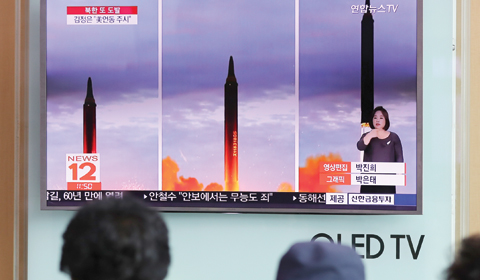Mattis still sees room for diplomatic solution
 SEOUL: People watch a TV screen showing a local news program reporting about North Korea’s missile launch at Seoul Train Station in Seoul yesterday. — AP
SEOUL: People watch a TV screen showing a local news program reporting about North Korea’s missile launch at Seoul Train Station in Seoul yesterday. — APWASHINGTON: President Donald Trump says that "Talking is not the answer" when it comes to North Korea. And he's claiming the US has been paying North Koreans what he calls "extortion money" for decades. "The US has been talking to North Korea, and paying them extortion money, for 25 years," Trump tweeted Wednesday morning, adding: "Talking is not the answer!"
The tweet comes on the heels of the North's recent missile test over Japan, a close American ally. Trump's tweet did not spell out what he meant by "extortion" in the current standoff over North Korea's nuclear program, and the White House did not immediately respond to questions.
North Korea has in the past temporarily halted nuclear development when the US and others provided food aid or other types of compensation. But the North hasn't been making such demands, at least publicly, since Trump came into office. Instead, it has been focused on finishing its decades-long effort to master the technology for fitting a nuclear warhead on a missile that can striking the US mainland, calling such capability essential for its national defense.
Trump's assessment about the need for dialogue also appears at odds with his top diplomat, Secretary of State Rex Tillerson, who had in recent weeks been softening the conditions for a possible, formal dialogue with Pyongyang. The US also has been maintaining a diplomatic back channel with North Korea.
Trump offered a surprisingly subdued response to Pyongyang's latest missile test Tuesday, avoiding a repeat of his bombastic warnings earlier this month of a potential military confrontation.
Nonetheless, US officials announced yesterday morning that they had conducted a missile defense test that resulted in the successful intercept of a medium-range ballistic missile off the coast of Hawaii. The test was conducted by the Missile Defense Agency and US Navy sailors.
"We are working closely with the fleet to develop this important new capability, and this was a key milestone in giving our Aegis BMD ships an enhanced capability to defeat ballistic missiles in their terminal phase," Missile Defense Agency Director Lt. Gen Sam Greaves said in a statement. "We will continue developing ballistic missile defense technologies to stay ahead of the threat as it evolves."
Diplomacy
US Secretary of Defense Jim Mattis said Wednesday that there was still room for diplomacy in dealing with North Korea's provocative ballistic missile launches, after President Donald Trump said negotiations were "not the answer." "We're never out of diplomatic solutions," Mattis said as he went into a meeting with South Korea Defense Minister Song Young-Moo.
"We continue to work together and the minister and I share responsibility to provide for the protection of our nation our populations and our interests, which is what we are here to discuss," he added.
North Korea leader Kim Jong-Un has promised more missile flights over Japan, insisting his nuclear-armed nation's launch was a mere "curtain-raiser," in the face of UN condemnation and US warnings of severe repercussions. The Hwasong-12 intermediate-range missile unleashed by Pyongyang represented a major escalation of tensions over its weapons programs.
The missile has the potential of reaching the US military base at Guam in the Pacific. In July, North Korea test-launched an intercontinental ballistic missile that theoretically could carry a nuclear bomb to the continental United States. - Agencies










